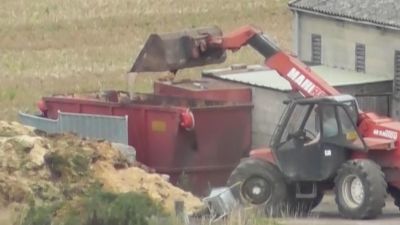Secret footage exposes shocking scenes of dead animal disposal

The shocking scenes are morally questionable but also pose a threat to health and safety, reports ITV News Wales and West of England Correspondent Rupert Evelyn
Bouncing up and down on a dead cow and driving back and forth over the carcass of another - bizarre and shocking scenes revealed in footage shared with ITV News.
It’s a window into an industry behind the red coats, horses and hounds that make up the traditional image of hunting and it is both morally and legally questionable.
The secret filming, commissioned by the energy provider Ecotricity, gives an extraordinary insight into the ‘Fallen Stock’ service provided by hunts to farmers and land owners who pay them to dispose of dead livestock.
Cows, sheep, hounds, partridges, ponies and foxes all end-up in skips. These bins, overflowing with animal body parts, are deemed to be of the highest risk to humans and animals yet the covert filming shows them left open to the elements.
Hidden cameras at five sites in England and Wales revealed hazardous waste exposed at all of them, satellite image analysis suggests there could be dozens more.
Magpies, chickens, dogs and crows are all seen either feeding from or trying to eat the dangerous waste. The rules on storing these materials are clear.
“The body or part of an animal… must be held… in such manner as to ensure no animal or bird will have access to it,” according to the regulations in Wales.
In England, government guidelines on the disposal of “high risk” animal by products (ABP) say organisations should have “a pest control programme as protection against insects, rats, birds and other pests” and that they should make sure “containers are leak-proof and securely covered immediately.”
Yet the footage tells a different story. Bins that cannot be closed as the rotting flesh and bones are piled so high, maggots swarming over them and dead animals left lying outside for 43 hours.
Keeping these sites bio-secure matters because it limits the risk of spreading diseases such as BSE or Mad Cow Disease as it’s known.
During the BSE crisis, four million cattle were slaughtered and 178 people died from the human form of the disease.
Regulations were tightened to ensure infected meat was incinerated and not fed back to livestock which explains why fallen stock services need to keep animal waste secure.
Alick Simmons is a former UK Deputy Chief Vet, who played an integral role responding to the BSE crisis. He said: “These animals should not have access to these bins. It's as simple as that. What we're worried about is disease transmitting from farm to farm, the imperative is to make sure that these carcasses are handled carefully and got rid of quickly.
"BSE has not gone, it's very, very rare, but it's still there. People who follow basic good practice wouldn't allow [this] to happen.”
When the bins are full of decomposing livestock, hounds and wild animals are eventually removed and sent to be processed into Meat and Bone Meal (MBM).
It’s a type of fuel that is burned to generate electricity. MBM is classed as renewable fuel.
Dale Vince is the founder of the Vegan certified energy company Ecotricity; he commissioned the undercover filming. “Look at the way they treat the animals that are in their care, the casual way they kill them, the way they treat their bodies after they've killed them. It's just incredible.
"We find animal abuse, breach of regulations. Something really shocking was the dumping of partridges that had been shot for fun, dumped in the bin, and used to make electricity and we just couldn't get our heads around that.”
ITV News approached all hunts that had been filmed. Their responses were very similar. Each said they were subject to routine inspections that ensured compliance with the regulatory requirements that they all said they adhered to.
This secret filming shows what happens when people don’t think they’re being watched. Distasteful to some, to others it’s the reality of rural life. It is alarming - raising questions about adherence to regulations, rules designed to protect both livestock and lives.
A spokesperson for the Department for Envrionment, Food and Rural Affairs said: “Robust biosecurity is fundamental, to protect human and animal health and our environment. “It is in the interest of any business or organisation to follow good practice.
"Fallen stock collectors must comply with the law, namely the Animal By-Products regulations, and can only operate under approval from the Animal and Plant Health Agency, who conduct regular inspections.
"Any breaches identified will result in enforcement action, which may lead to revocation of approval by APHA and prosecution by local authorities.”